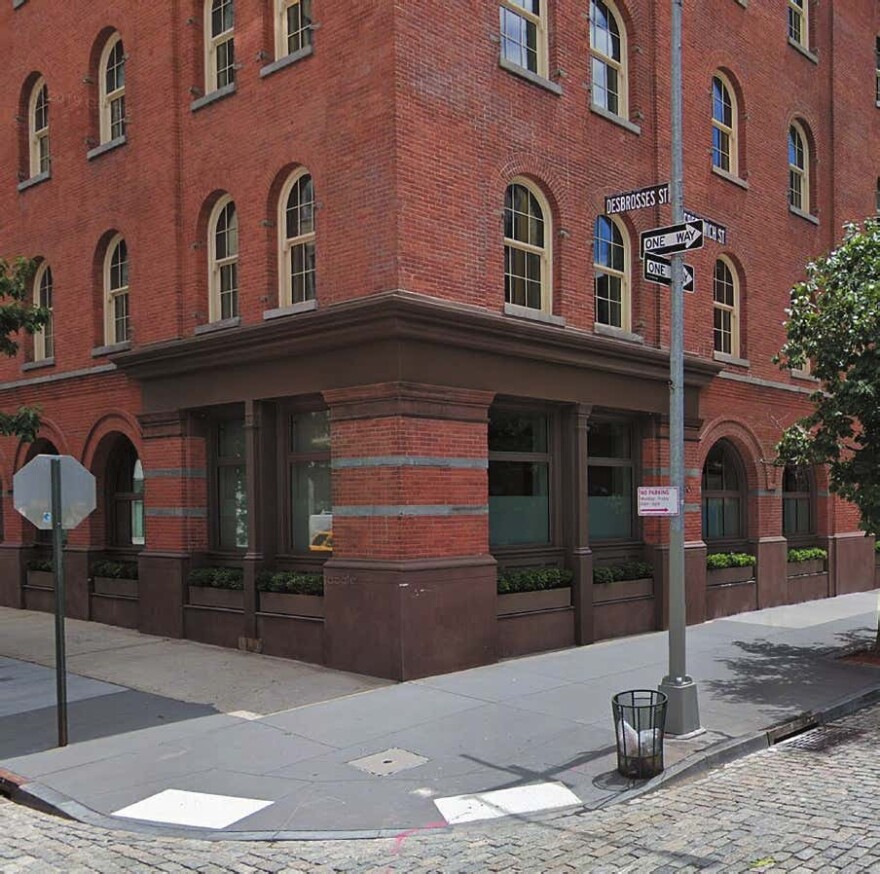The story of Desbrosses Street, in Lower Manhattan, is a story of a warehouse district turned into apartments, of people taking up residence in the once abandoned area and forming a neighborhood, of neighbors who live in homes and neighbors who live on the street.
As a 20-something, composer Michael Gordon moved into an abandoned factory on Desbrosses Street in 1981. He has now chronicled decades of his neighborhood’s growth and change, his life and times with friends and conversations with two of his homeless neighbors in Anonymous Man, recently released in a recording by the Philadelphia-based professional choir The Crossing, conducted by Donald Nally.
This is a tale of two / One lives inside / The other one outside, reads Gordon’s text for the work’s opening movement.

Anonymous Man is much more than “a tale of two.” It’s the buzz and hum of the warehouse building Gordon occupies. It’s the windows of his loft apartment rattling “from the cold and rain”… the “dark and desolate” streets in the area outside.
It’s layer upon layer of lives and events and uncomfortable realities.
Gordon, co-founder of the Bang on a Can music collective and festival, calls Anonymous Man a memoir of his block. And Gordon's music is at once clear in rhythmic and melodic impulse, and indistinct in how those elements overlap, creating a beguilingly elusive musical chiaroscuro.
“A lot of it is written so that the clarity of the lines are slightly blurred,” said Donald Nally of Gordon’s score. “You hear the main voice, but then you hear lots and lots of other voices creating a cloud around it. That is how memory works. You’re thinking, I remember this, this and this…but I can’t remember that. And it clouds the experiences.”

Gordon introduces his neighborhood in the work’s second movement, “I Moved,” along with the members of his band, Peter and The Girlfriends, which, Gordon tells us, “rehearsed on Desbrosses Street at night at full volume, making all the noise we liked.”
Gordon’s prose text for Anonymous Man reads like unfrilled reportage and dips into the poetic in only the most subtle ways. The minimalism in Gordon’s music amplifies his words in disarmingly direct melodies, harmonies and rhythms.
“With Michael’s music, here’s this composer and there’s no degree of separation between the words, the object, and the composer,” Nally said, “and there’s only a small degree of separation between him and us.”
The scene set, Gordon zooms in on a tight shot of Larry, in the third movement (“On Desbrosses Street”).
Ever since I’ve lived on Desbrosses Street, the text reads, there have been people living on the street. As long as I remember Larry, quiet and sweet, muttering, waving.
Gordon sets these words to sparse melodies performed in tight imitation by the sections of the choir, the straightforward rhythms and close repetitions of the text undulating in haunting musical mutterings.
In the fourth movement (“It’s Julie Passing Through Town”), Gordon meets Julie, the composer Julia Wolfe, whom he would marry. Then, in the fifth movement (“I First Noticed Robinson”), he writes about a homeless man named Robinson.
I first noticed Robinson. He was impossible to ignore. He stood out because he had a lot of belongings. He spent the day within a radius of a few blocks, with a mysterious urgency.
Robinson talks with Gordon about the books he reads, books in English and in French, books about history and philosophy, a volume containing the complete plays of Aristophanes.
Gordon’s lines are spartan and metronomic, full of the relentless clicking of the beat as Robinson busies himself with the never-ending work of moving his belongings.
Robinson lives in front of the building across the street, while that building is under renovation and obscured by scaffolding. When the renovation work is finished and the scaffolding comes down, Robinson tells Gordon he will be moving, and Gordon unleashes this devastating paradox:
And with the increase in foot traffic, the doormen and the new residential tenants, the street offers less protection. The street offers less obscurity. The street offers less anonymity.
Anonymity as an ironic survival mechanism in a life of no domestic privacy. Anonymity guaranteeing the tragic safety of invisibility in a culture where only individuality seems to matter. Anonymity marking Robinson, Larry and so many others on the street as its own.
Gordon chronicles the blue sky and unfolding horrors of Sept. 11, 2001 in “On That Terrible Beautiful Morning,” full of swooping vocal glissandi that transform into a soundspace overrun with sirens as Erie hushed chaos enveloped the streets, smoke and flame pouring out above us.
He shows us a makeshift street memorial for one of the homeless. Then, in a striking juxtaposition of time and class, recounts the story of Abraham Lincoln’s elaborate funeral cortege as it rolled down Desbrosses Street. And finally, Gordon turns the camera on his conscience. “I Sleep At Home” seeks to make sense of why some have so much when many have so little.
Gordon’s Anonymous Man is not opulent. Everywhere you look are just the bare essentials – an abandoned warehouse neighborhood, young artists scraping by, men living on the street with only a few armfuls of belongings. The text and music of Anonymous Man embody the essence of existence – living with other people, living in the shadows of other people. The spartan melodies both shore each other up and grate against each other, like ugly truths bubbling up through the depths of willful ignorance.
The Crossing’s performance is slender and shimmering and devoid of histrionics. The power of this performance is that it doesn’t feel like a performance. It feels like a visit to Desbrosses Street, in all its many layers, with all its unanswered questions.



